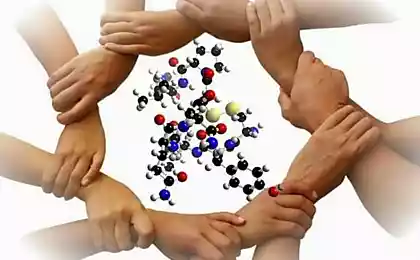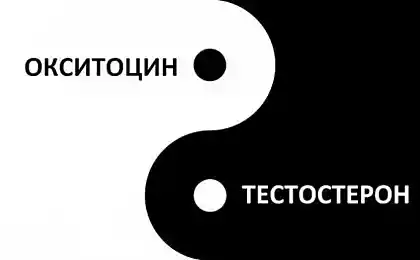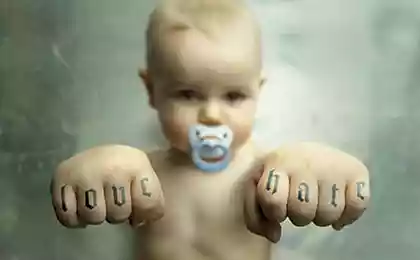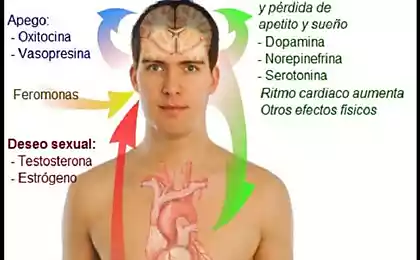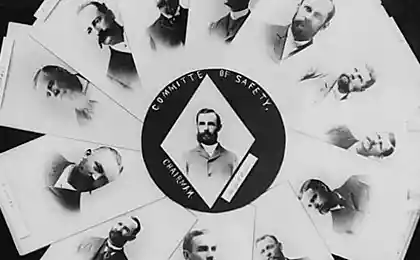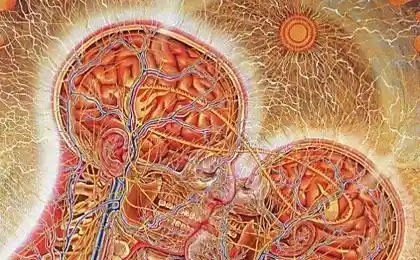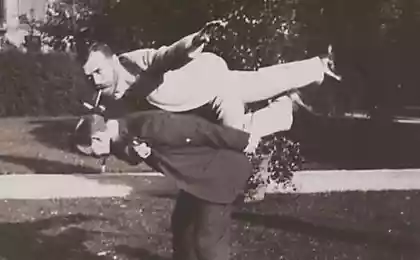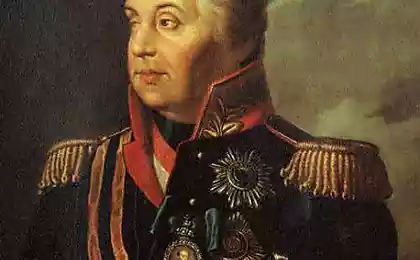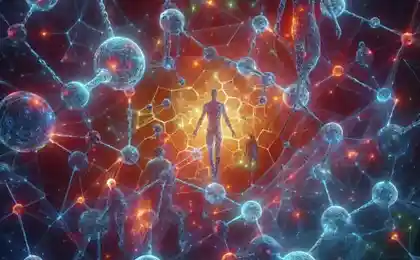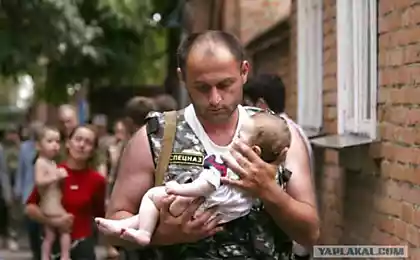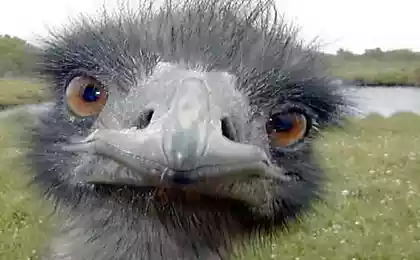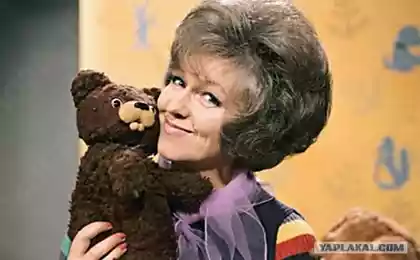469
Oxytocin: Peace and War
"The neuropeptide oxytocin plays an important role in the regulation of social and sexual behavior of animals. For different mammalian species (from rats to people) revealed the ability of oxytocin to stimulate affiliative (friendly), sexual and parental behavior, to suppress fear, to increase credulity and susceptibility to positive social stimuli. In addition, oxytocin stimulates people defensive aggression against outsiders in the context of intergroup competition.
German primatologia, studying wild chimpanzees in the tai national Park (côte d'ivoire) showed that intergroup conflict in chimpanzees are associated with higher levels of oxytocin in the urine. When collective hunting for small monkeys chimpanzees oxytocin also increases but not as much. New evidence suggests that oxytocin is a chimp not "hormone of love and friendship", and "the hormone of love, friendship and war.
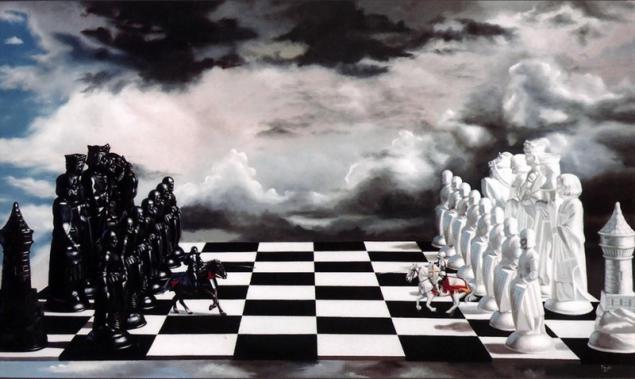
Add a small comment myself. Informal, unscientific, incorrect, pure speculation and rough biologization, yeah.
This is very important work, thanks to which, in General terms, it is the whole oxytocin puzzle. Oxytocinergic system in mammals has long been used for the regulation reproduktivnogo and parental behavior. Social types and those who form stable mating pairs, this system kooperatsia for the maintenance of affiliative (friendly) relations and affections, and to coordinate group actions (as, for example, when collective hunting for small monkeys that practiced by chimpanzees). The species, which are characterized by regular violent intergroup conflicts (like chimpanzees and humans), this system may be involved in more and for maintenance of parochialness and parahealing altruism.
"The hormone of love and friendship" becomes "Hormone of love, friendship, coordination of group activities and war" (do not cling to this use of the term "hormone", I use here the word in an extended sense, so in quotes).
Oxytocinergic developed system of regulation of social behavior — your one-stop pre-adaptation for the establishment of a system governing military behavior. Oxytocin increases affiliation; sensitivity to positive socially relevant stimuli (i.e. affiliative actions and signals relatives); hence the cohesion, the sense of "one for all and all for one" combat brotherhood — mixed with the strong sense of love for "their" to comrades, to those who are with us.
Oxytocin blunts the sense of fear — in the case of parental behavior it is useful to protect a baby. How this is useful in case of war — no need to explain.
And oxytocin increases trust (shown in humans). Hence the increased vulnerability to propaganda emanating from "their" if there is a social context of "our beat". Only a very lazy leader uses this vulnerability (and losing battle).
In the discussion paper described the behavior of chimpanzees during the initiation of combat RAID. Loud screaming, running around, hugs, increasing arousal, setting off each other's genitals. Then begins the RAID and the monkeys fall silent, focus, go quietly and sensitively, keeping order.
Compare this, for example, with a typical medieval battle scenes in golivudskih films (which may give us an idealized, fairy-tale, but its natural representation of the initiation of intergroup clashes). First, fear and doubt, then the fiery speeches of leaders, the loud cries, hugs, a sense of military brotherhood and the fear recedes, and there is a calm determination... I, thank God, never took part in the fighting. But, remember the feelings that captured the participants of protest rallies. Remember, many had the feeling that there are so many wonderful people. This, I think, was the release of oxytocin, stimulated by the social context in which "we together against them."
Looks like love and war are tightly bound through oxytocinergic system. This relationship, of course, in no case is unbreakable. The bad thing is that intergroup hostility is the strongest incentive to love, and therefore, people will be very difficult to get rid of the hatred. published
Author: Alexander Markov
P. S. And remember, just changing your mind — together we change the world! ©
Source: macroevolution.livejournal.com/223474.html
German primatologia, studying wild chimpanzees in the tai national Park (côte d'ivoire) showed that intergroup conflict in chimpanzees are associated with higher levels of oxytocin in the urine. When collective hunting for small monkeys chimpanzees oxytocin also increases but not as much. New evidence suggests that oxytocin is a chimp not "hormone of love and friendship", and "the hormone of love, friendship and war.

Add a small comment myself. Informal, unscientific, incorrect, pure speculation and rough biologization, yeah.
This is very important work, thanks to which, in General terms, it is the whole oxytocin puzzle. Oxytocinergic system in mammals has long been used for the regulation reproduktivnogo and parental behavior. Social types and those who form stable mating pairs, this system kooperatsia for the maintenance of affiliative (friendly) relations and affections, and to coordinate group actions (as, for example, when collective hunting for small monkeys that practiced by chimpanzees). The species, which are characterized by regular violent intergroup conflicts (like chimpanzees and humans), this system may be involved in more and for maintenance of parochialness and parahealing altruism.
"The hormone of love and friendship" becomes "Hormone of love, friendship, coordination of group activities and war" (do not cling to this use of the term "hormone", I use here the word in an extended sense, so in quotes).
Oxytocinergic developed system of regulation of social behavior — your one-stop pre-adaptation for the establishment of a system governing military behavior. Oxytocin increases affiliation; sensitivity to positive socially relevant stimuli (i.e. affiliative actions and signals relatives); hence the cohesion, the sense of "one for all and all for one" combat brotherhood — mixed with the strong sense of love for "their" to comrades, to those who are with us.
Oxytocin blunts the sense of fear — in the case of parental behavior it is useful to protect a baby. How this is useful in case of war — no need to explain.
And oxytocin increases trust (shown in humans). Hence the increased vulnerability to propaganda emanating from "their" if there is a social context of "our beat". Only a very lazy leader uses this vulnerability (and losing battle).
In the discussion paper described the behavior of chimpanzees during the initiation of combat RAID. Loud screaming, running around, hugs, increasing arousal, setting off each other's genitals. Then begins the RAID and the monkeys fall silent, focus, go quietly and sensitively, keeping order.
Compare this, for example, with a typical medieval battle scenes in golivudskih films (which may give us an idealized, fairy-tale, but its natural representation of the initiation of intergroup clashes). First, fear and doubt, then the fiery speeches of leaders, the loud cries, hugs, a sense of military brotherhood and the fear recedes, and there is a calm determination... I, thank God, never took part in the fighting. But, remember the feelings that captured the participants of protest rallies. Remember, many had the feeling that there are so many wonderful people. This, I think, was the release of oxytocin, stimulated by the social context in which "we together against them."
Looks like love and war are tightly bound through oxytocinergic system. This relationship, of course, in no case is unbreakable. The bad thing is that intergroup hostility is the strongest incentive to love, and therefore, people will be very difficult to get rid of the hatred. published
Author: Alexander Markov
P. S. And remember, just changing your mind — together we change the world! ©
Source: macroevolution.livejournal.com/223474.html
